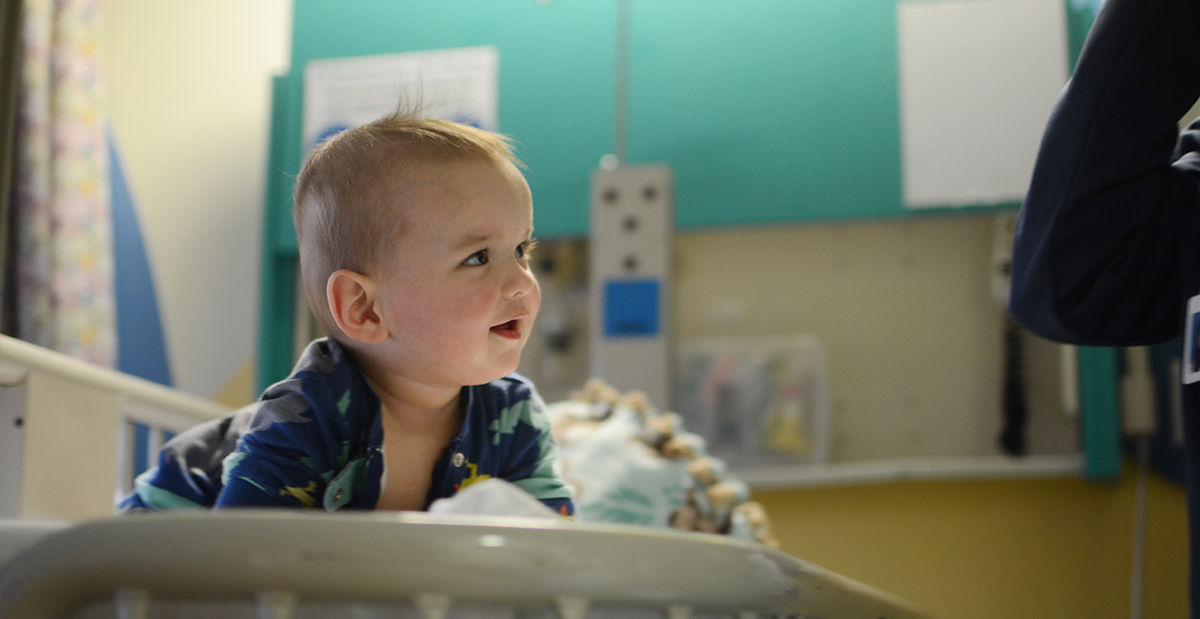
Apr 02, 2020 / Hip Disorders
Developmental Dysplasia of the Hip: What Parents Need to Know
At Scottish Rite for Children, we have a team of experts who are committed to caring for patients with various hip conditions – from the common to the complex – from infancy through young adulthood. Developmental dysplasia of the hip (DDH) is an orthopedic condition in which the hip joint is unstable or has a shallow socket. It can present at birth or within the first few weeks of a child’s life. During those times of uncertainty, our team is here to provide comfort and expert care to every patient.
For nearly ten years, the Center for Excellence in Hip has been conducting a study which follows patients diagnosed with DDH until they are 16 years old. Information collected in this registry includes patient’s ultrasound and X-ray images, family history and clinic evaluations. The data gathered has been instrumental in developing a new way for our providers to examine, classify and determine the best treatment options for patients with DDH. Additionally, the research has helped our providers educate parents and fellow clinicians on DDH risk factors, treatment and prevention.
Here are a few things you should know:
“As a team, we understand the concerns and worries you may have when your newborn has to be seen by a specialist,” says Podeszwa. “We want to assure you that we are here to help, provide comfort and most importantly, evaluate each child and determine the best form of treatment to make sure they live a happy and healthy life.”
If your child is waiting to be evaluated for DDH, here are a few tips from Dr. David Podeszwa:
For nearly ten years, the Center for Excellence in Hip has been conducting a study which follows patients diagnosed with DDH until they are 16 years old. Information collected in this registry includes patient’s ultrasound and X-ray images, family history and clinic evaluations. The data gathered has been instrumental in developing a new way for our providers to examine, classify and determine the best treatment options for patients with DDH. Additionally, the research has helped our providers educate parents and fellow clinicians on DDH risk factors, treatment and prevention.
Here are a few things you should know:
- If your primary care provider notes an abnormal exam (i.e. the hip feels loose or unstable), we recommend seeing one of our pediatric orthopedic experts within 7-10 days.
- If a hip click is felt on physical exam (without the hip feeling loose or unstable), we recommend physical exam and ultrasound by our team no sooner than six weeks of age. An ultrasound obtained after 6 weeks of age is more reliable and decreases the chance of unnecessary treatment.
- If your child was born breech or there is a family history of DDH (i.e. siblings or parents) and the primary care provider’s physical exam is normal, we recommend waiting until at least 6 weeks of age for an evaluation and ultrasound.
- First-born
- Female
- Babies born in breech position
- Family history of DDH or hip dysplasia (parents or siblings)
- Maternal history of oligohydramnios (low fluid in the womb during pregnancy)
“As a team, we understand the concerns and worries you may have when your newborn has to be seen by a specialist,” says Podeszwa. “We want to assure you that we are here to help, provide comfort and most importantly, evaluate each child and determine the best form of treatment to make sure they live a happy and healthy life.”
If your child is waiting to be evaluated for DDH, here are a few tips from Dr. David Podeszwa:
- Stay calm.
- Do not treat your child any differently than you normally would.
- If you swaddle your child, do not swaddle the child’s legs. The legs should remain free so that the child can move them without restriction. A sleep sack that allows you to swaddle the child’s arms but leaves the legs free is a good option. Check out this video.
- Do not double/triple diaper (extra diapers) your child. This adds costs and there is no evidence to show this will help prevent or treat hip dysplasia.
- Every child is different. Be careful of what you read online. Much of what you read may not have anything to do with your child.



